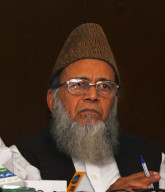
Frustrating popular will by propping up dictators in the Muslim world has contributed, among other ills, to the proliferation of extremism and a dearth of sincere and capable leaders. This, in turn, has resulted in a lack of institution building, a prerequisite to the progress and stability of societies in modern times. And this has certainly set back the social, economic and political clocks of the Muslim world for the foreseeable future.
The fear that religious parties will gain an edge in Muslim countries if democracy is given a chance is misguided, to say the least. In Pakistan, for instance, religious parties went through a drubbing in the elections and could hardly muster about 4.5 per cent of the total vote polled in the general elections of 2013. The reason: people had alternatives.
The US has since long supported dictatorships in the Muslim world. The array of reasons given has varied from keeping the oil flowing to the security of Israel. The futility of these specious arguments is laid bare for all those who are willing to see them. These policies have no doubt hurt the Muslim world immeasurably, if that was the objective, but payoffs for the US have also been dubious at best. However, the resultant bitterness and hostility has given ample fodder to antagonists on both sides to tailor messages and advance their specific agendas.
Indeed, the current US policy towards Egypt is refreshing. It has rightly refused to back the military coup in Egypt which ousted the democratically elected government of Mohamed Morsi, though unfortunately, there was not much to celebrate in the short-lived tenure of Mr Morsi.
Leadership in Muslim countries has seldom been earned by merit. It has mostly been inherited or bequeathed by bayonets and with blessings of foreign patrons. Consequently, the quality of Muslim governance has suffered inestimably. These inept and insecure leaders are inflaming sectarian violence, which is ripping apart the social fabric of Muslim societies.
The US should not support dictatorships anywhere in the world and by extension, not even in Muslim countries. There is lots of misguided talk by self-declared political pundits that the US is losing its eminence in the Middle East by not heeding its allies. They maintain that the security of Israel and US objectives are better served if the strife in Muslim societies is contained rather than resolved. It is apparent that these experts prefer not to derive any lessons from Iraq or Afghanistan.
The US administration should stand firm in its policy and resolution to help democracy take hold in Muslim societies, if it wishes them well. It will take time for this policy to bear fruit but it will certainly bring genuine benefit to Muslim countries, the US and the world at large.
Published in The Express Tribune, January 30th, 2014.
Like Opinion & Editorial on Facebook, follow @ETOpEd on Twitter to receive all updates on all our daily pieces.
COMMENTS (9)
Comments are moderated and generally will be posted if they are on-topic and not abusive.
For more information, please see our Comments FAQ










































So you expected the USA to go to intervene and go to war to remove the heads of Muslim nations so that the people could vote? You think that would improve the USA image in the Muslim World? Rubbish. How about Muslim's finally taking responsibility for their own condition.
@sm:
What are the laws of theocracy?
Rex Minor
"The US should not support dictatorships anywhere in the world and by extension, not even in Muslim countries." "Not even in Muslim countries"? It is exactly what the US is doing. Monarchy is another form of dictatorship and the US finds it more comfortable to deal with one person/one royal family than to have to deal with different sets of ruling parties in a democracy. "The US administration should stand firm in its policy and resolution to help democracy take hold in Muslim societies, if it wishes them well." How can anybody be so naive as to expect another country, and USA at that, to help the Muslim countries to have democratic regimes? As for "wishing them well", let it be understood that the USA always acts only with its own interests, long or short term, in mind.
If the type of governments in the US/UK are representative of democracy who needs it. Once their democratically elected representatives are elected they completely ignore the wishes of the electorate and wait for their instructions from a small Eastern Mediterranean country.
@ Tariq Shah By using the term "muslim world", i.e., defining a population based on a religion, you are already denying democracy (or even human rights) any fighting chance.
But Muslim countries also want to have dictatorships. Why blame anyone else, when the fault lies with these countries. Stop blaming others for once and start introspecting for your own sake. The world will be a better place.
Why is the author blaming the US for the ills of the Islamic world? When Musharraf took over from Nawaz Sharif after the Kargil fiasco, was the US involved? Democracy can thrive, if there is adequate separation between Mosque and State. Can the Islamic countries ensure that? No. Since once you declare a country to be Christian or Islamic or Hindu, your laws of the State are formulated based on religion and democracy gets thrown out by theocracy.